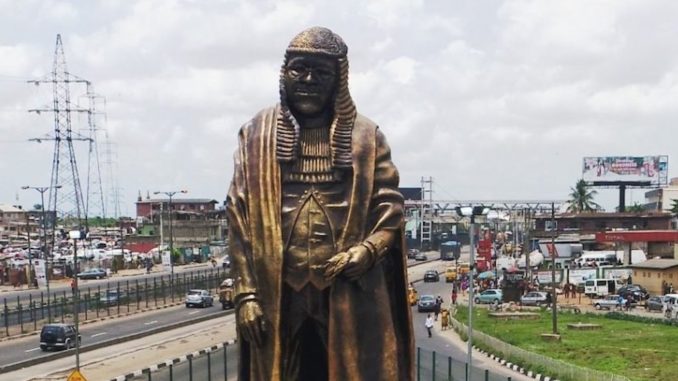
On Wednesday, President Muhammadu Buhari announced the conferment of the Grand Commander of the order of Niger (GCON) on Gani Fawehinmi, the late human rights lawyer.
GCON is the second highest national honour in the land.
Buhari also honoured the late MKO Abiola, presumed winner of the June 12, 1993 election, with the Grand Commander of the Federal Republic (GCFR), the highest honour in the land and Baba Gana Kingibe, his running mate, with GCON.
In his lifetime, Fawehinmi was a vocal critic of the government, both military and civilian. Different military regimes incarcerated him but his fire of activism did not die.
There have been different reactions to the conferment of the award by Buhari. While Mohammed, his first son, described it as a welcome development, adding that the family had been looking forward to it, Fatai Ibu-Owo, chairman of the Lagos state chapter of the National Conscience Party (NCP), said Fawehinmi would have rejected the award if he were alive.
In 2008, the late President Musa Yar’adua awarded the lawyer the Officer of the order of the Federal Republic (OFR), but Fawehinmi rejected it, citing many years of misrule since independence.
“This is the first government in Nigeria to honour me with the national award. Obviously, this government must have considered my activities in the last forty-three years before deciding to give the national award of Officer of the Order of the Federal Republic (OFR). From my own standpoint and perception, my struggles and crusades include:
“I have had time after the publication to think deeply whether to accept or reject the honour,” Fawehinmi had said in a statement.
“I thank the president of the Federal Republic of Nigeria, Alhaji Umam Musa Yar’Adua. I thank the federal government of Nigeria and I am very grateful to the Council of State which approved the honour of Officer of the Order of the Federal Republic (OFR) given to me by the Federal Republic of Nigeria.
“In the course of my struggles over the decades for the above ideals, I have been subjected by various governments to all traumatic travails and persecutions.”
Lamenting the poor state of the country’s health sector, Fawehinmi said the country had not lived up to expectation.
“Today, I am seventy years and eight months old and 1 am struck down by lung cancer for which I have been receiving medical treatment outside my country because my country Nigeria has one of the poorest medical services in the world but one of the richest countries in the world in terms of oil revenue,” he had said.
“My decision to either accept or reject the national honour of the award of Officer of the Order of the Federal Republic (OFR) will depend on how far the Nigerian nation through Nigerian governments tried to achieve some listed goals.”
He accused the government of Yar’Adua of not fighting corruption and protested the removal of Nuhu Ribadu, pioneer chairman of the Economic and Financial Crimes Commission (EFCC).
“In the light of the above, I cannot accept the “honour’ of Officer of the Order of the Federal Republic (OFR). Whether now or in the life beyond, how can I wake up in the morning and look at the insignia of honour bestowed on me under a government that persecutes anticorruption efforts, particularly those of Nuhu Ribadu?
“A government that covertly and overtly encourages corruption has no honour in its arsenal of power to dispense honour. Consequently, I reject the dishonour of officer of the Order of the Federal Republic (OFR) termed ‘honour’ given to me by the Federal Government.”
Fawehinmi died nine months after rejecting the award.
END

Be the first to comment